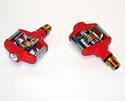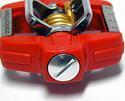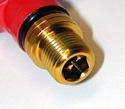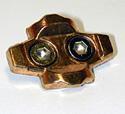
Recently on Cyclingnews.com |
Review - August 31, 2004
Crank Brothers Candy Ti pedals
Do-everything mountain bike pedals
From the original Egg Beater, Crank Brothers spawned a whole range of pedals for mountain and road. John Stevenson takes a spin on the lightweight, titanium-axled version of the Candy 'all-mountain' pedals.
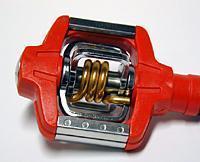
|
When they arrived a couple of years ago Crank Brothers Egg Beater pedals were an instant hit with riders who prize low weight over most everything else. It didn't hurt that they also worked pretty well and their open design made them excellent at clearing mud. But for some riders there was just not enough pedal there, and Crank Brothers reacted with the Candy pedal, which puts a small resin platform around the Egg Beater mechanism to provide some extra support for your shoes and a bigger target for a flailing foot to hit when you're trying to engage in a hurry.
At 250g, a pair of Candy pedals is still pretty light - our sample pair was helped in the mass department by titanium axles which of course also help to lighten your wallet, but even the steel-axled versions are not exactly weighty.
The Crank Brothers pedal mechanism is deceptively simple: four spring-loaded engagement bars present an easy entry to the cleat and can be quickly rotated so that they're in the right place for the cleat to engage. In fact, this happens automatically - stomp on the pedal and you end up with a pair of bars under your feet, however the mechanism was originally aligned.
|
|
|
|
|
|
|
And it works. Stomp on the pedal and - bosh - you're clipped in. I found it was almost impossible to miss the mechanism, and a bit of wiggling soon found it. Clipping in, in short, was easy enough that there's nothing more to say about it. Except, perhaps, that this is a significant improvement on the original Egg Beaters, which I found fiddly to get into because there was no body to guide the cleat into place.
Releasing was a slightly different story, initially at least. There's no way to adjust the release tension of an Egg Beater style pedal, but the spring tension is moderate and the mechanism doesn't release until your foot is at a 15 or 20 degree angle. You change the release angle by swapping the cleats between left and right feet. However, I found that the soles of my shoes were thicker than was ideal for the Candies and there was often enough friction to impede release.
To deal with this sort of problem, you usually have to take a blade to the sole of the shoe to trim away some rubber. Crank Brothers anticipates that not all shoes are equally thick and supplies four thin plastic shims that fit under the cleats, making it easier to engage and disengage.
I spent Sunday afternoon riding, among other things, the course at Killingworth that will be used for the NSW state XC championships on September 12. It's a varied and immensely fun loop with some challenging singletrack climbs and some very interesting descents, of the sort where you really want to be sure you can unclip if you stuff up. I'm pleased to say I spent a bit of time outside my (admittedly limited) comfort zone, not least thanks to the certainly that I'd be able to pop out of the Candies if I needed to.
All in all, I can't fault the Candy Ti pedals for the function of the engagement and release mechanism.
Long-term users of Crank Brothers' pedals report that you do have to make sure you maintain the bearings. A screw-in plastic grease port is included with the pedals and it's a simple matter to remove the dustcap, fit the grease port, pump in new grease then swap the dustcap back out. However, while this kind of maintenance isn't essential with many pedals, it is vital with Candies, as the pedal turns on a bushing at one end and a ball-bearing at the other and bushings really don't like being run dry. Crank Bros recommends fresh grease every 100-300 hours of riding, which isn't too arduous a schedule and fortunately, if you do neglect them, spares are available and the pedals can be rebuilt.
The Ti is the lightest of the three incarnations of the Candy pedal, along with the Candy C (308g/pr, US$100) and the Candy SL (294g, US$120). At US$250 the Candy Ti represents a serious premium for its 58g weight saving over the C - if weight saving isn't worth $3/g to you, then we'd go for one of the less spendy versions.
Recommended retail price: US$250
Weight: 250g/pr
Pro: Easy release and entry; low weight; red!
Con: Make sure you keep up the maintenance schedule, pricy for the weight
saving
Cyclingnews Rating: ![]()
More information: Crank
Brothers' website

